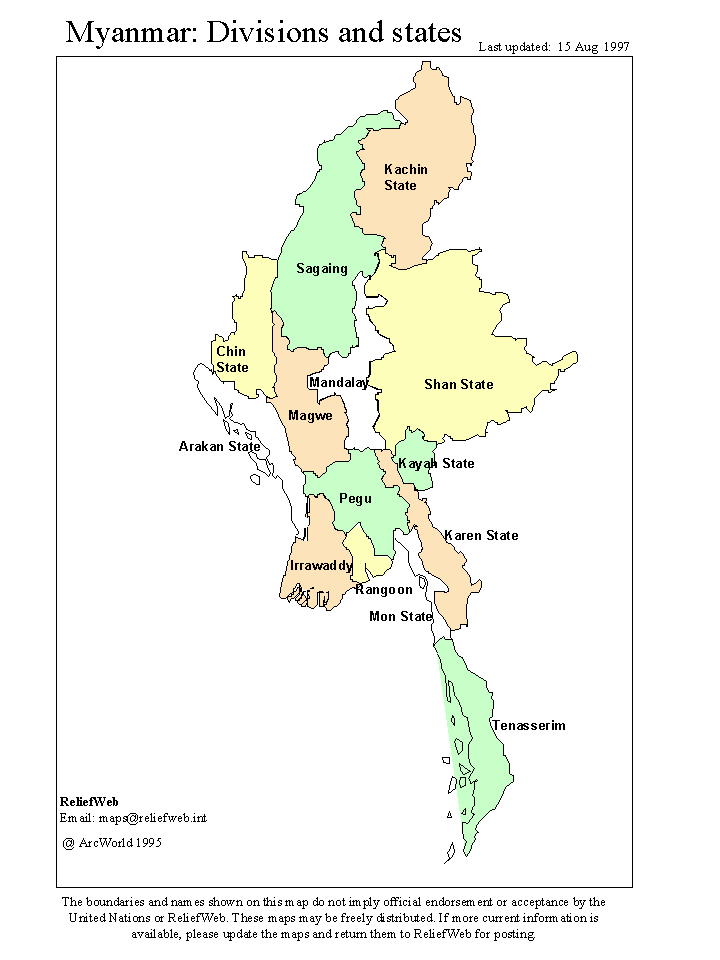





 Burma provides the bulk of the world's opium supply. It produces about 84 percent of the opium cultivated in Southeast Asia. Most of this supply of illicit opiates is produced in ethnic minority areas of Burma's Shan State, such as the Kokang and Wa territories over which Burmese authorities have minimal control. Since 1989, the State Law and Order Restoration Council (SLORC) has negotiated cease-fire agreements with the drug trafficking groups that control these areas, offering them limited autonomy and developmental assistance in exchange for ending their insurgencies. Because the SLORC's highest priority has been to end the fighting and the threat to its national security, counternarcotics efforts in these areas have been a secondary consideration, even though the groups are said to have agreed to the gradual phaseout of opium cultivation and drug trafficking within their areas. Nevertheless, there has been no discernible effort by these groups to reduce trafficking or production. Following the surrender of Khun Sa, the Kokang, Wa and Essa areas in particular became drug trafficking havens where opium was produced and refined with relative impunity. As part of the SLORC's efforts to bring the ethnic groups under its control, it granted leaders of these drug trafficking armies significant political legitimacy, and several participate in the government's National Constitutional Convention. These leaders have exploited their relationship with Rangoon to expand their businesses -- legitimate and illegitimate -- although their prosperity has not filtered down to the ordinary people of the ethnic areas.
The State Law and Order Restoration Council (SLORC) negotiated the "surrender" of the notorious drug lord Khun Sa and his Mong Tai Army (MTA) in January 1996. According to the SLORC, the terms of the surrender stipulated that in return for ending his insurgency and surrendering his weaponry, Khun Sa would be allowed to live under close government supervision in Rangoon, where he could engage indirectly, via third-party investors, in legitimate business -- but not drug trafficking -- and would not be prosecuted for his trafficking activities or extradited to the US. The MTA drug trafficking network has been disrupted, but reports suggest that Khun Sa and his MTA associates are still involved in the trade. Overall trafficking from Burma has not diminished, as other groups, particularly the Wa, took up the slack caused by the dissolution of Khun Sa's army. Moreover, Khun Sa has not been brought to justice in Burma, and the GOB has refused USG requests to turn him over for prosecution in the US. Indeed, the SLORC treats him with respect, addressing him with the traditional honorific. The "surrender" of Khun Sa allowed the Burma Army to project its authority into the former MTA area. The military disrupted, at least temporarily, trafficking routes and destroyed a number of heroin refineries in the area.
Burma provides the bulk of the world's opium supply. It produces about 84 percent of the opium cultivated in Southeast Asia. Most of this supply of illicit opiates is produced in ethnic minority areas of Burma's Shan State, such as the Kokang and Wa territories over which Burmese authorities have minimal control. Since 1989, the State Law and Order Restoration Council (SLORC) has negotiated cease-fire agreements with the drug trafficking groups that control these areas, offering them limited autonomy and developmental assistance in exchange for ending their insurgencies. Because the SLORC's highest priority has been to end the fighting and the threat to its national security, counternarcotics efforts in these areas have been a secondary consideration, even though the groups are said to have agreed to the gradual phaseout of opium cultivation and drug trafficking within their areas. Nevertheless, there has been no discernible effort by these groups to reduce trafficking or production. Following the surrender of Khun Sa, the Kokang, Wa and Essa areas in particular became drug trafficking havens where opium was produced and refined with relative impunity. As part of the SLORC's efforts to bring the ethnic groups under its control, it granted leaders of these drug trafficking armies significant political legitimacy, and several participate in the government's National Constitutional Convention. These leaders have exploited their relationship with Rangoon to expand their businesses -- legitimate and illegitimate -- although their prosperity has not filtered down to the ordinary people of the ethnic areas.
The State Law and Order Restoration Council (SLORC) negotiated the "surrender" of the notorious drug lord Khun Sa and his Mong Tai Army (MTA) in January 1996. According to the SLORC, the terms of the surrender stipulated that in return for ending his insurgency and surrendering his weaponry, Khun Sa would be allowed to live under close government supervision in Rangoon, where he could engage indirectly, via third-party investors, in legitimate business -- but not drug trafficking -- and would not be prosecuted for his trafficking activities or extradited to the US. The MTA drug trafficking network has been disrupted, but reports suggest that Khun Sa and his MTA associates are still involved in the trade. Overall trafficking from Burma has not diminished, as other groups, particularly the Wa, took up the slack caused by the dissolution of Khun Sa's army. Moreover, Khun Sa has not been brought to justice in Burma, and the GOB has refused USG requests to turn him over for prosecution in the US. Indeed, the SLORC treats him with respect, addressing him with the traditional honorific. The "surrender" of Khun Sa allowed the Burma Army to project its authority into the former MTA area. The military disrupted, at least temporarily, trafficking routes and destroyed a number of heroin refineries in the area.
The ethnic drug trafficking armies with which the government has negotiated cease-fires, such as the United Wa State Army (UWSA) and the Myanmar National Democratic Alliance Army (MNDAA-Kokang Chinese), remain armed and heavily involved in the heroin trade and have to some extent moved into territory vacated by Khun Sa's former MTA. The top leaders of these ethnic groups are: U Sai Lin (Lin Ming-Shing) of the Eastern Shan State Army (ESSA); Yang Mao-Liang, Peng Chia-Sheng and Liu Go-Shi of the MNDAA; Pao Yu-Chiang, Li Tzu-Ju and Wei Hsueh-Kang of the United Wa State Army; and U Mahtu Naw of the Kachin Defense Army (KDA).
